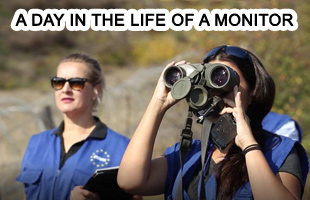The third round of the Geneva talks, bringing around the same table the parties of the August war in Georgia, took place on 17 and 18 December. Although no formal agreement was signed, participants expressed satisfaction that some progress was made and talks were held in a positive and constructive atmosphere. This was not obvious after the first rounds of the talks in October and November, which had stalled mainly because of procedural questions.
The main topic of the discussion was the setting up of a mechanism to tackle security related incidents on the ground. The European Union Monitoring Mission (EUMM) in Georgia, whose main tasks are stabilisation, normalisation and confidence-building after the August hostilities, has been working on the establishment of such a mechanism since the beginning of its operations on 1 October. The situation in the zones adjacent to South Ossetia and Abkhazia remains tense with the frequent occurrence of shootings, mine blasts, kidnapping of local residents and attacks on Georgian police units. Under these circumstances, the population feels exposed to continuous insecurity and does not feel confident enough to go back to a normal life.
The Geneva participants agreed that the exchange of information between all security structures on both sides of the administrative boundary lines would be a useful instrument to bring clarity into incidents that have already taken place and to prevent the happening of new ones. Within this framework, EUMM has proposed to conduct regular meetings between Georgian and de facto law enforcement representatives. The Head of EUMM, Ambassador Hansjörg Haber, explained the intended mechanism: “Whenever there is an incident, both sides immediately accuse the other one – quasi as a reflex. We want that both sides sit around the same table and are obliged to provide information that is trustworthy and verifiable.”
Access of international observers to Abkhazia and South Ossetia was another topic discussed in Geneva, but no agreement on the issue has been reached. Strong of a mandate that covers the whole territory of Georgia, including the breakaway regions, EUMM will continue its “knocking on the door”-policy. “It is indispensable to monitor incidents from both sides of the administrative boundary lines in order to give an objective and complete picture of the situation on the ground”, explains Ambassador Haber.
The next round of Geneva talks is scheduled for 17 and 18 February 2009.
The main topic of the discussion was the setting up of a mechanism to tackle security related incidents on the ground. The European Union Monitoring Mission (EUMM) in Georgia, whose main tasks are stabilisation, normalisation and confidence-building after the August hostilities, has been working on the establishment of such a mechanism since the beginning of its operations on 1 October. The situation in the zones adjacent to South Ossetia and Abkhazia remains tense with the frequent occurrence of shootings, mine blasts, kidnapping of local residents and attacks on Georgian police units. Under these circumstances, the population feels exposed to continuous insecurity and does not feel confident enough to go back to a normal life.
The Geneva participants agreed that the exchange of information between all security structures on both sides of the administrative boundary lines would be a useful instrument to bring clarity into incidents that have already taken place and to prevent the happening of new ones. Within this framework, EUMM has proposed to conduct regular meetings between Georgian and de facto law enforcement representatives. The Head of EUMM, Ambassador Hansjörg Haber, explained the intended mechanism: “Whenever there is an incident, both sides immediately accuse the other one – quasi as a reflex. We want that both sides sit around the same table and are obliged to provide information that is trustworthy and verifiable.”
Access of international observers to Abkhazia and South Ossetia was another topic discussed in Geneva, but no agreement on the issue has been reached. Strong of a mandate that covers the whole territory of Georgia, including the breakaway regions, EUMM will continue its “knocking on the door”-policy. “It is indispensable to monitor incidents from both sides of the administrative boundary lines in order to give an objective and complete picture of the situation on the ground”, explains Ambassador Haber.
The next round of Geneva talks is scheduled for 17 and 18 February 2009.


